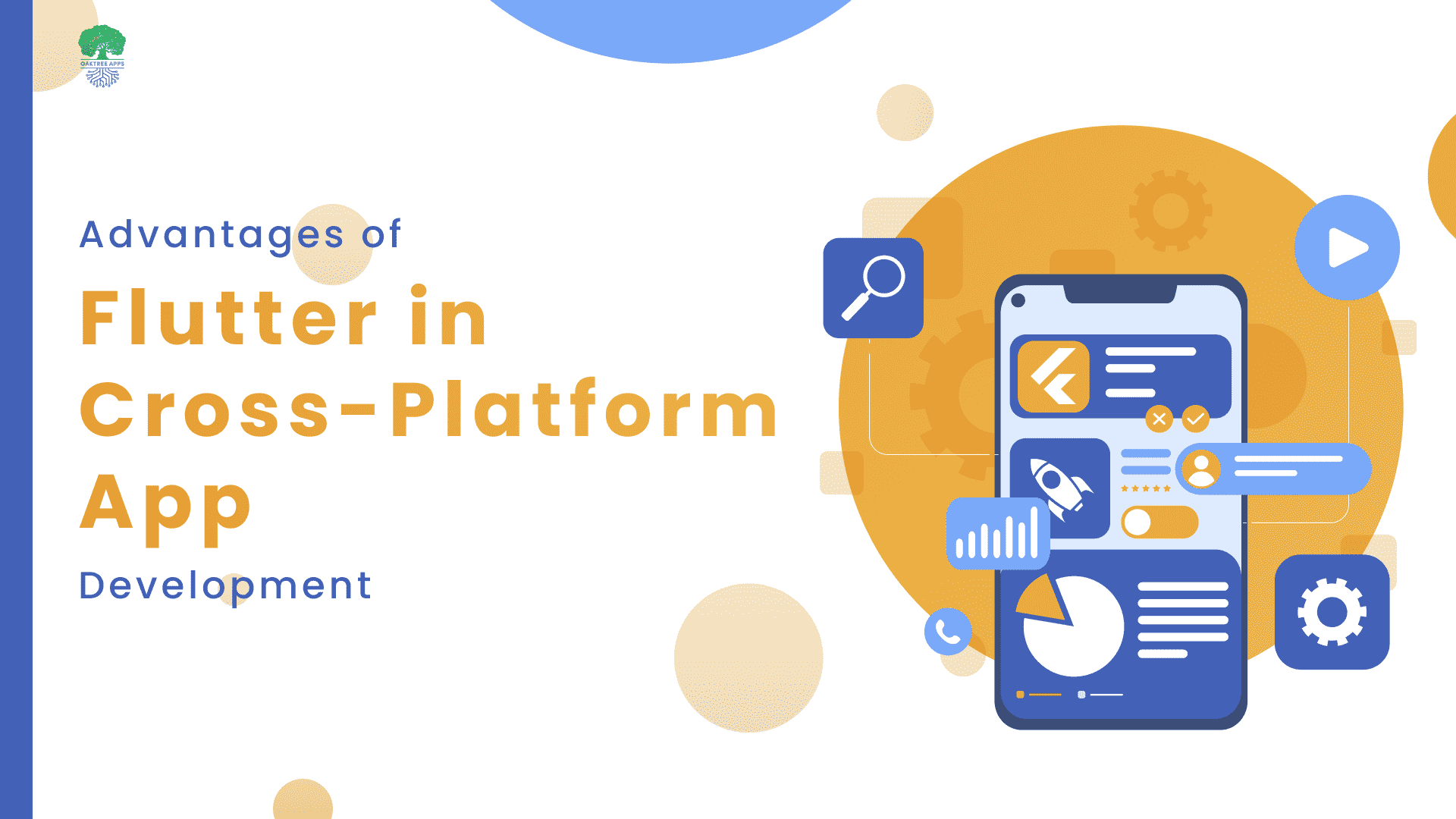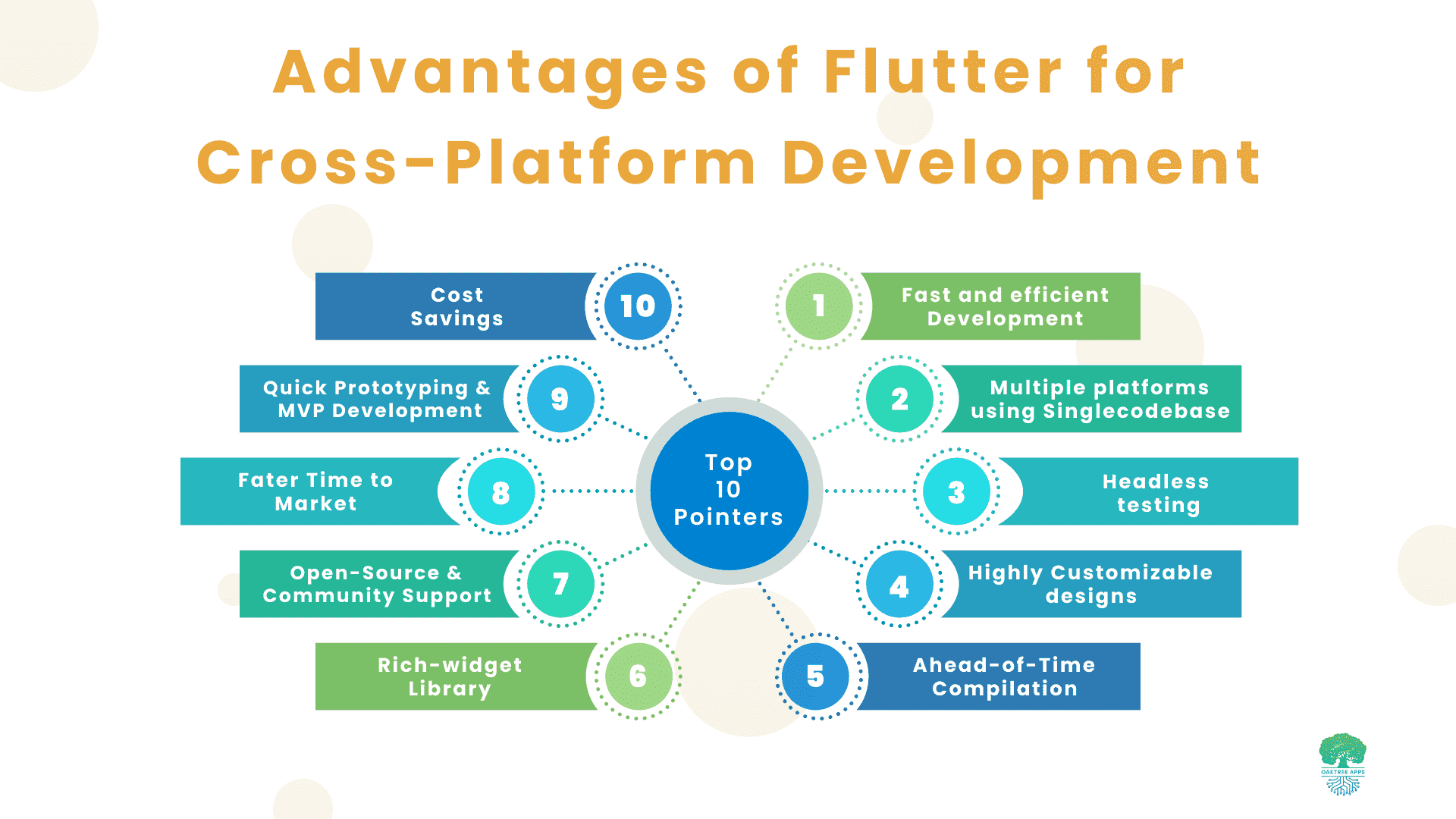Aug 10 2023

Businesses continuously seek efficient and cost-effective solutions to develop applications that can reach a broad audience across multiple platforms. Cross-platform app development has emerged as a popular approach to address this need. There is no shortage of cross-platform frameworks and app development tools in the market, each vying for developers' attention, including React Native, PhoneGap, Ionic, and Xamarin. In a short period, Flutter, powered by Google, has been able to carve its own space and transform cross-platform app development. App development using Flutter enables developers to create applications for multiple platforms using a unified codebase, offering the additional benefit of seamless adaptation and deployment across Android, iOS, web, and desktop platforms.
In this article, we will explore why Flutter stands out among other hybrid frameworks and programming languages and what advantages it offers for cross-platform development.
Flutter Comparison
| Feature | Flutter (Dart) | React Native (JavaScript) | Xamarin (C#, .NET) | Ionic (JavaScript/TypeScript) | Native Script (JavaScript/TypeScript) |
|---|---|---|---|---|---|
| Language | Dart | JavaScript | C#, .NET | JavaScript/TypeScript | JavaScript/TypeScript |
| UI/UX Components | Extensive widgets | Native components | Native components | Web Components | Native components |
| Performance | Near-native | Near-native | Near-native | Slower than Native | Near-native |
| Hot Reload | Yes | Yes | Yes | Yes | Yes |
| Community Support | Strong | Strong | Strong | Strong | Strong |
| Platform Support | iOS, Android, Web, Desktop | iOS, Android, Web (React Native Web) | iOS, Android, Windows, macOS | iOS, Android, Web | iOS, Android |
| Popularity | Rapidly Growing | Widely Adopted | Established | Popular | Growing |
| Reactive Framework | Yes | Yes | No | Yes | Yes |
| No Bridge to Native Components | Yes | No | No | No | Yes |
| WebView Dependency | No | No | No | Yes | No |
| Customizable UI | Highly customizable | Limited customization | Limited customization | Customizable | Highly customizable |
| Consistent UI Across OS Versions | Yes | No | Yes | No | Yes |
| Testing Efforts | Reduced testing efforts | Separate test suites | Separate test suites | Reduced testing efforts | Reduced testing efforts |
| Offline Asset Support | Yes | Yes | Yes | Yes | Yes |
Advantages of Flutter for Cross-Platform Development

Fast and Efficient Development:
Flutter's hot reload feature enables developers to instantly view changes in the code without recompiling the entire application. This feature accelerates the development process, making fixing bugs and experimenting with different UI elements easier. In a case study by Groupon, they rebuilt their merchant app using Flutter, resulting in a 20-50% reduction in code development time. This rapid development cycle also allows businesses to respond quickly to user feedback and market demands.
Single Codebase, Multiple Platforms:
Flutter allows you to write a single codebase that works seamlessly across iOS and Android platforms. This means developers don't need to maintain separate codebases for each platform, reducing development time and effort. This approach not only saves development time but also ensures consistency in the app's behavior and appearance on different devices and operating systems.
Headless testing:
Framework allows developers to test their apps on devices without a user interface (UI). Based on the dart:ui library, it provides low-level access to the Flutter engine, enabling interactions with rendering, gestures, and animations. This framework is advantageous for automated testing as it doesn't require a simulator or emulator, allowing tests to be run on real devices and catch specific errors efficiently. The isolated tests also ensure high speed, enabling thousands of tests to be run in just a few minutes.
AOT Compilation:
Flutter uses Dart programming language with Ahead-of-Time (AOT) compilation that enables the Dart code to be compiled into native machine code rather than interpreted at runtime by a virtual machine. AOT compilation reduces build times by eliminating the need for code interpretation at runtime. Also, AOT-compiled code runs faster due to direct native execution; developers can catch errors early with available debugging information at compile time. Finally, AOT-compiled code results in a smaller app size as it does not include a virtual machine or interpreter, leading to optimized storage and faster downloads.
Rich Widget Library:
Flutter offers an extensive collection of pre-designed widgets, making it easier for developers to create captivating UIs. These widgets can be customized to match the app's branding, resulting in a visually appealing and engaging user experience. Additionally, it allows developers to create custom widgets and tailor them to fit the specific requirements of the app.
Native-Like Performance:
Flutter apps are compiled directly into native machine code, resulting in high performance and faster execution. The Flutter framework leverages the GPU for rendering, ensuring smooth animations and a responsive user experience. For example, ByteDance, owner of popular Social Media Group Tik Tok was looking to create a large number of apps that worked across multiple platforms. They used Flutter and were able to increase their productivity by 33%.
Open-Source and Strong Community Support:
Flutter is an open-source framework, which means developers can access the source code and contribute to its improvement. The Flutter community is highly active and supportive, providing numerous packages, plugins, and solutions. This level of support ensures that developers have access to a wide range of resources, which aids in the faster development of apps. The Flutter ecosystem also includes the Dart language community, adding to its overall strength.
Highly Customizable Designs:
Flutter provides a flexible and customizable UI design system, enabling developers to create stunning and unique app interfaces. It allows businesses to create a branded and appealing app experience.
Faster Time-to-Market:
With its efficient development process and hot reload feature allows developers to see changes instantly, speeding up the development process. This means faster iterations, quicker bug fixes, and a shorter time-to-market for your app.
Unleash Possibilities with Flutter Cross-Platform App Development
Elevate your app's reach and efficiency with our expertise
Consult Our Flutter ExpertsQuick Prototyping and MVP Development:
Flutter's fast development cycle makes it ideal for prototyping and building Minimum Viable Products (MVPs). This enables businesses to test their ideas quickly and validate them with users before making significant investments.
Access to Native Features:
Flutter provides a rich set of plugins and integrations that allow access to native features like camera, GPS, and storage. This ensures that your app can leverage the full potential of the underlying platforms.
UI/UX Customization:
Flutter's rich set of widgets and customizability empowers developers to create highly polished and aesthetically pleasing UIs. For instance, the app "Reflectly” (a journaling app) was built using Flutter and won a Google Play Award for the "Best Daily Helper" app category, showcasing its ability to create engaging user experiences.
Cost Savings:
Using Flutter for cross-platform app development can lead to substantial cost savings. The cost of Flutter app development is lowered by creating cross-platform applications, as it eliminates the requirement for dedicated teams for iOS and Android development. The single codebase approach also reduces maintenance costs over the app's lifetime. For instance, Alibaba, one of the world's largest e-commerce companies, used Flutter to build its "Xianyu" app (a peer-to-peer marketplace). By using Flutter, they saved 30% in development costs compared to developing separate native apps for iOS and Android.
Easy Learning Curve:
Flutter's simplicity and straightforward documentation make learning relatively easy, especially for developers with prior experience in languages like JavaScript, Java, or Swift. This reduces the onboarding time for new team members and makes it accessible for a broader pool of developers.
Accessibility Support:
Flutter provides excellent support for accessibility features out of the box. This makes it easier for developers to create apps that are accessible to users with disabilities, meeting essential compliance standards.
Offline Asset Support:
Flutter allows developers to bundle assets directly within the app package, enabling offline access to resources like images, fonts, and videos. This is particularly advantageous in scenarios with limited internet connectivity.
No Bridge to Native Components:
Unlike some other hybrid frameworks, Flutter does not rely on a bridge to communicate with native components. Instead, it uses its rendering engine to create UI components, improving performance and reducing overhead.
Bundled UI and Logic:
Flutter packages UI and logic together, simplifying code organization and making it easier to maintain and understand the app's behavior.
Easy Integration with Existing Apps: Flutter can be seamlessly integrated into existing apps, enabling you to enhance your app's features without starting from scratch.
Seamless Integration with Backend Technologies: Flutter can easily integrate with various backend technologies and APIs, allowing your app to communicate efficiently with servers and databases.
Enterprise App Solutions: Flutter is well-suited for enterprise app development, where consistency, speed, and cost-effectiveness are crucial. Businesses can deploy feature-rich and visually consistent apps across their workforce, streamlining operations and improving efficiency.
Hire the Best Flutter App Development Company
Experience streamlined innovation for your app vision with our expertise
Contact UsConclusion:
In conclusion, Flutter proves to be a standout choice for cross-platform app development, offering numerous advantages over other hybrid frameworks and programming languages. Its single codebase, near-native performance, hot reload feature, and extensive widgets make development faster, cost-effective, and highly customizable. The ability to target multiple platforms, including mobile, web, and desktop, widens the scope of app reach and potential user base. Within the realm of Flutter app development, whether you're crafting an MVP for a startup or an intricate enterprise-level application, the platform equips you with the necessary tools and flexibility to construct captivating, feature-rich apps that will undoubtedly resonate with users. As the Flutter ecosystem continues to grow and mature, it promises to play an even more significant role in shaping the future of cross-platform app development.

